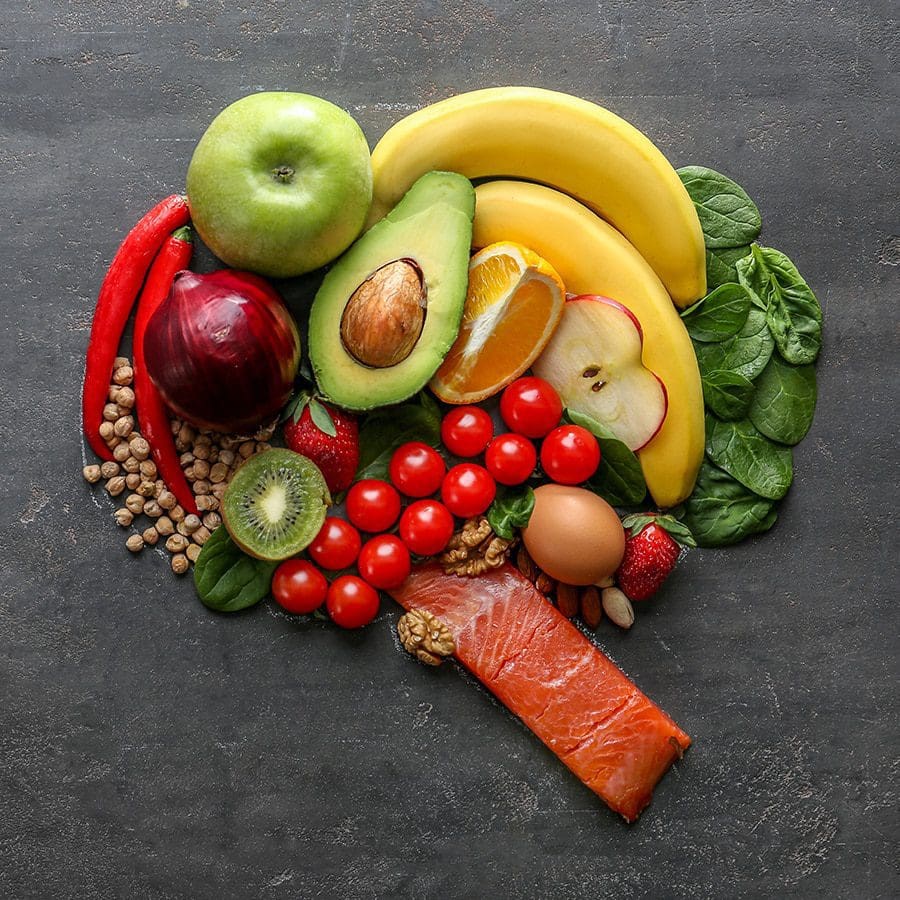
By Cynthia McFarland
Feed Your Brain

Local experts weigh in on foods that boost brain health.
Your state of mind is influenced by what’s happening in your gut.
In other words, what you eat and drink impacts your focus, short-term memory, motivation, even the ability to solve math problems.
“When people are dealing with imbalance in the gut, it affects the brain indirectly, and poor diet often causes imbalances in the gut,” says Katie Gravante, a clinical nutritionist at Total Nutrition & Therapeutics in Lady Lake.

Lori Johnson, MS, RD, LD/N
Going Green
Balanced nutrition is key. A common mistake is not eating enough fruits and vegetables, notes UF/IFAS Extension Lake County Family & Consumer Science Agent Lori Johnson, MS, RD, LD/N.
“We want to ‘eat the rainbow.’ Each meal should have two to three different food groups,” she says. “Everyone should have at least two to three servings each of fruits and vegetables at every meal.”
Fruits and veggies deliver fiber.
“You want to eat 25 to 30 grams of fiber a day found in whole grains, fruits and vegetables. Eat the edible skins in pears, apples, and potatoes, because this is where a lot of the fiber is,” Johnson says.
Because fiber helps your gut, it contributes to brain health.
To enhance focus and motivation, Lori and Katie recommend dopamine-rich foods like fatty fish, lamb, chicken, turkey, beef, eggs, lentils, nuts, pumpkin and sesame seeds, broccoli, spinach and green tea.
Spices such as turmeric, saffron, peppermint and cinnamon also support mental health and focus. Try using spices instead of salt to flavor food.
“Everyone is trying to make their dollars stretch as far as they can right now,” adds Lori. “Food is the best medicine, so focus on getting your nutrients from good food sources rather than supplements.”
“Supplements are just an add-on,” says Katie. “You have to clean up your diet.”
Avoid Bad Fats
Trans fats — commonly found in processed and fried foods — aren’t good for your brain. Hint: they aren’t in whole foods. (“Whole” means food in its natural state that hasn’t been changed or processed.)
“Hydrogenated oil,” listed on the label of countless food products, is a trans fat.
Brain function is enhanced by healthy fats, such as those contained in avocados, olive oil, nuts and seeds.

Katie Gravante, Clinical Nutritionist
Steer Clear
“When you take out things that are unhealthy – like processed foods, trans fats and sugary foods – it makes a huge difference in how your body responds to blood sugar stabilization, energy level and focus in general,” says Katie.
Processed foods and drinks not only spike blood sugar, but they can trigger inflammation.
With that in mind, make soda a rarity and steer clear of diet versions.
“Studies have shown that the aspartame in diet soda is directly linked to brain atrophy and cancer in general,” notes Katie.
Your brain depends on specialized signaling chemicals that have a host of responsibilities. These important neurotransmitters include:
- Dopamine
- Serotonin
- Gamma-Aminobutyric acid (GABA)
- Acetylcholine
Don’t Forget H2O
Your brain simply cannot function properly if you’re not adequately hydrated. After all, it consists of more than 85 percent water. Upgrading your diet includes drinking enough H2O.
The average American drinks less than 32 ounces of water a day. That won’t cut it for brain health.
Brain fog, trouble focusing, fuzzy short-term memory, lack of mental clarity, depression and emotional instability are just a few symptoms
of dehydration.
You don’t have to be slogging across the Sahara to experience such symptoms. Studies reveal that just being one percent dehydrated can result in a five percent decline in cognitive function.
A general rule of thumb is to drink at least half your body weight in ounces of water per day. For example, a 130-pound woman would need a minimum of 65 ounces of water daily.
“It’s not just about drinking plain water, you need quality electrolytes to truly hydrate. At least two glasses of water each day should include electrolytes without artificial sweeteners,” adds Katie, who recommends unsweetened coconut water diluted with plain water.
For those who dislike water, Lori advises flavoring it with fruits and spices for 12 to 24 hours before drinking.
These foods serve as building blocks to increase the activity of neurotransmitters.
- Eggs
- Avocado
- Broccoli
- Beet greens
- Spinach
- Collard Greens
- Swiss Chard
- Brussels sprouts
- Tomatoes
- Sweet potatoes
- Summer squash
- Chickpeas
- Black beans
- Quinoa
- Lentils
- Shrimp
- Scallops
- Salmon
- Tuna
- Sardines
- Lamb
- Chicken
- Turkey
- Beef
- Pumpkin seeds
- Sesame seeds
- Walnuts
- Almonds
- Cashews
- Dark chocolate
"I fell in love with words early on and knew from fourth grade that I wanted to be a writer,” says Cynthia McFarland. A full-time freelancer since 1993 and the author of nine non-fiction books, her writing has earned regional and national awards. Cynthia lives on a small farm north of Ocala; her kids have fur and four legs







































